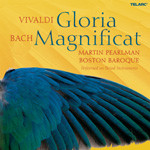
Gloria in D / Magnificat
 $41.00
Out of Stock
$41.00
Out of Stock6+ weeks add to cart
VIVALDI / BACH
Gloria in D / Magnificat
Tamara Matthews / Deanne Meek / Stephen Powell / Don Frazure / Boston Baroque / Martin Pearlman
[ Telarc Records / SACD ]
Release Date: Saturday 28 January 2006
This item is currently out of stock. It may take 6 or more weeks to obtain from when you place your order as this is a specialist product.
Boston Baroque and Director Martin Pearlman bring us exuberant performances of two of the most popular Baroque choral works of all time, Vivaldi's Gloria and J.S. Bach's Magnificat.
Hybrid/SACD
DSD 2 Channel Recording 6 Channel Recording
Playable on all compact disc players.
Boston Baroque and Director Martin Pearlman bring us exuberant performances of two of the most popular Baroque choral works of all time, Vivaldi's Gloria and J.S. Bach's Magnificat. Boston Baroque's previous three recordings of Baroque choral masterpieces-Handel's Messiah, Monteverdi's 1610 Vespers, and Bach's B minor mass-won international acclaim and Grammy nominations for Best Choral Performance.
Speaking about the pairing and the ensemble, Telarc producer Thom Moore says: "This recording represents the marriage of two great artistic dimensions. The period instrument ensemble with the small chamber chorus brings a refreshing, vital new take on these beloved classics. This is another example of what Opera News called 'Pearlman's roster of consistently fresh, illuminating interpretations of baroque and classical masterpieces.'"
Of the Gloria, Pearlman writes in his liner notes: "When the modern-day Vivaldi revival began early in the last century, attention focused mainly on the composer's concertos, these being particularly interesting to scholars and musicians because of their influence on Bach. But in the late 1920s, the picture of Vivaldi changed, when a large collection of his vocal music was discovered in Turin. Suddenly, he was much more than a composer of violin concertos. The Gloria recorded here, discovered in that Turin collection, received its twentieth-century premiere in 1930 and has remained the most popular of all Vivaldi's vocal works ever since."
Antonio Vivaldi spent the greater part of his professional life teaching at the Ospedale della Pietà in Venice, an institution for orphaned and homeless girls, famous for its high level of musical training. As maestro di coro, Vivaldi not only supervised the girls' musical education but also composed new religious music for the Pietà. This is the second of the two settings by Vivaldi of the Gloria section of the mass that have come down to us. The fact that the work calls for only three soloists-and that all three are women-suggests that the music could well have been written for the girls at the Pietà.
The Magnificat-Mary's song of praise and thanksgiving-is given a brilliant and moving performance by Pearlman, Boston Baroque, and the five soloists. J.S. Bach's setting is vibrant and celebratory, written for a large and colorful orchestra: three trumpets, timpani, flutes, oboe, oboe d'amore, bassoon, strings, and continuo, as well as a five-part chorus instead of the usual chorus in four parts.
Bach originally composed the Magnificat in 1723 for his first Christmas service at the St. Thomas Church in Leipzig, and re-worked it in the early 1730s. It is this later and more familiar version that is recorded here. The concise work contains thirteen movements, including numbers for each of the five soloists, a duet for alto and tenor, a trio for the two sopranos and alto, and six choruses. The movements are by turn jubilant and reflective, melancholy and airy.
Pearlman writes: "Bach's setting of the Latin text is filled with interesting details and word painting. At the word dispersit ("scatters"), the chorus disperses in a rain of individual voices. The tenor opens his aria Deposuit with a violent descending scale to depict the text 'He hath put down the mighty.' And there is the stirring effect near the end, at the words 'Thus it was in the beginning,' where Bach brings back the music from the beginning of the work. To these, we might add the wonderful pun at the end of the alto aria Esurientes, where Bach illustrates the words 'He hath sent the rich away empty' by having the solo flutes omit their final note."
A brilliant quintet of soloists joins Pearlman and the ensemble for the Gloria and Magnificat: Tamara Matthews, soprano; Deanne Meek, mezzo-soprano; Mary Phillips, alto; Don Frazure, tenor; and Stephen Powell, baritone.
This recording is the perfect example of Martin Pearlman and Boston Baroque's high caliber of musicianship, interpretation and excellence that makes BB one of the leading period instrument ensembles.